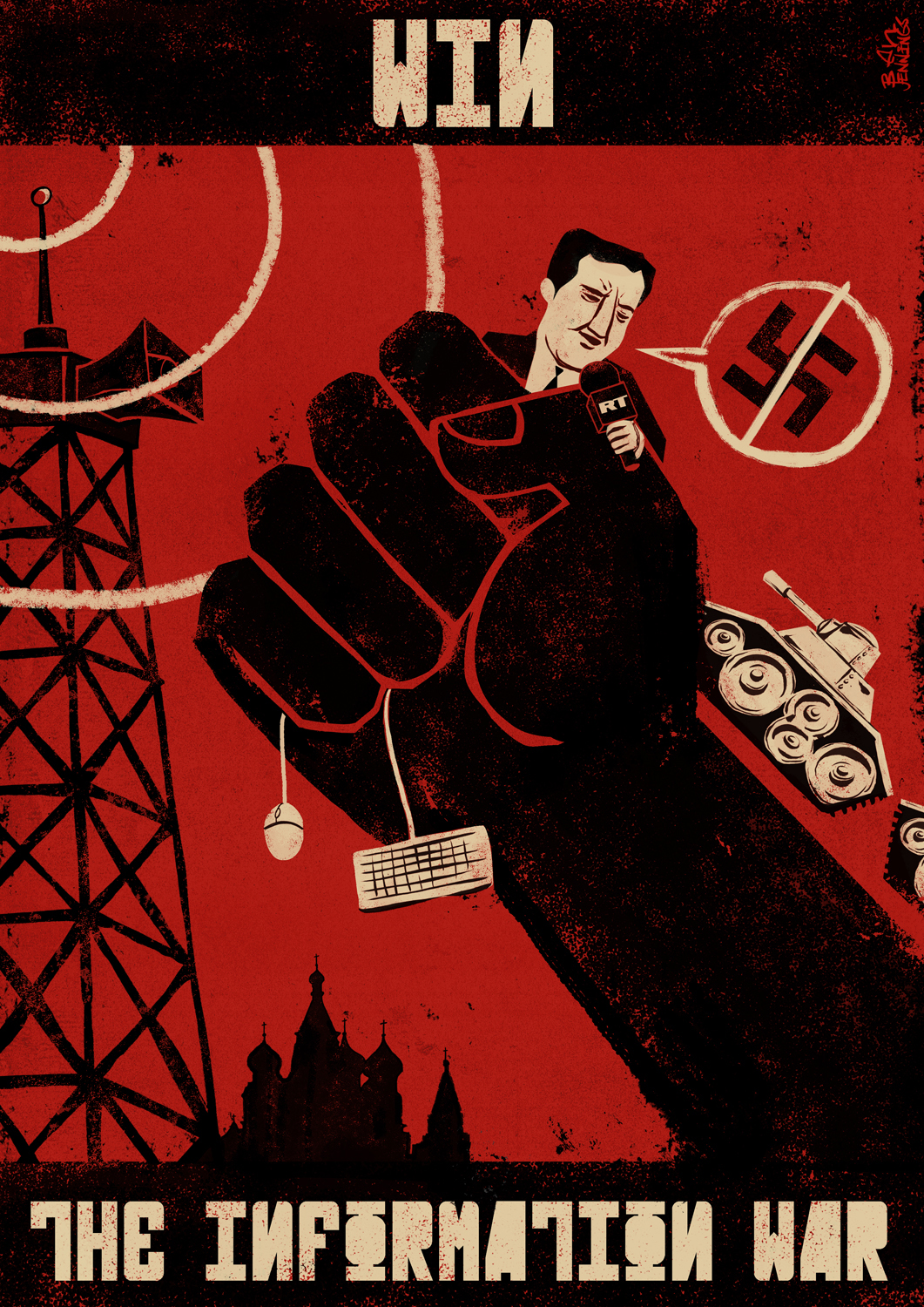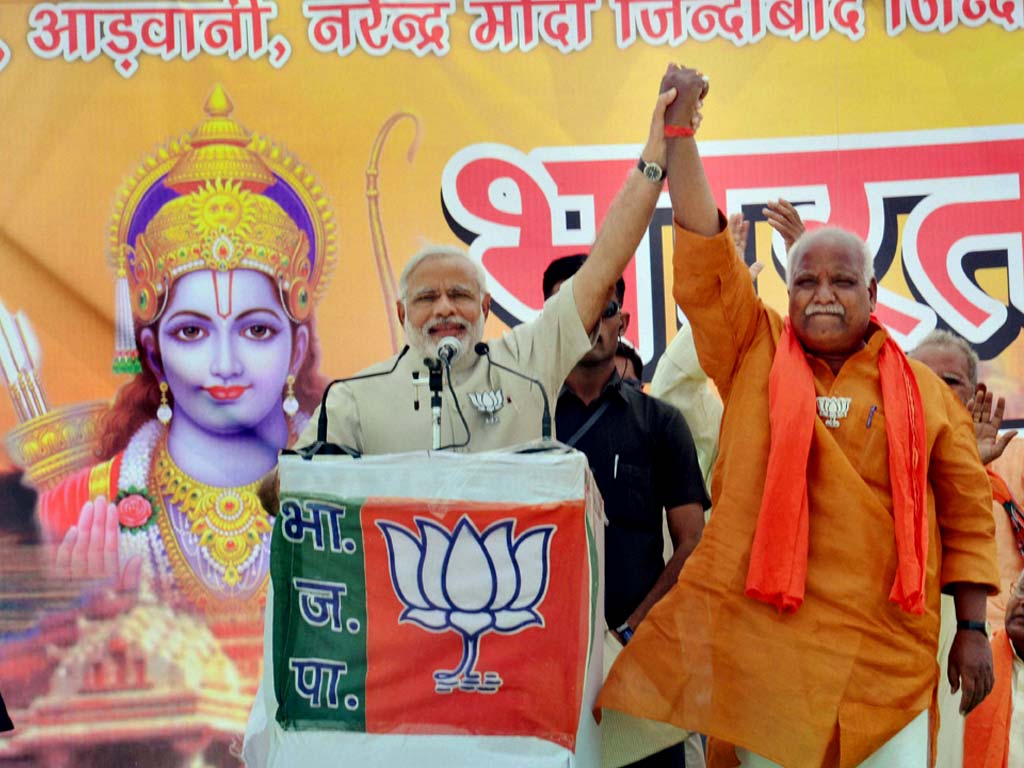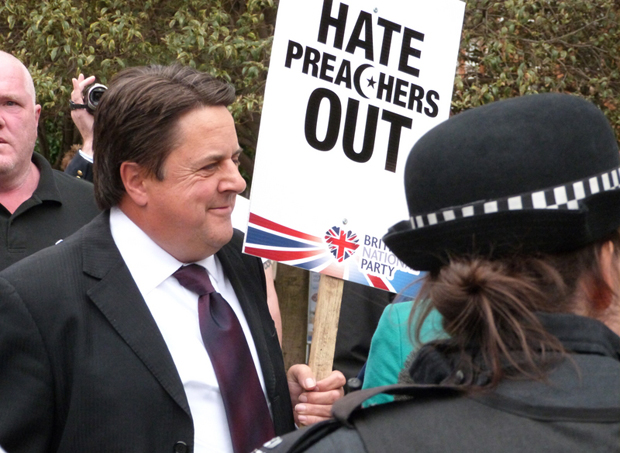Ben Jennings: Russia’s propaganda machine
This week cartoonist Ben Jennings takes on Vladimir Putin’s information war.

This week cartoonist Ben Jennings takes on Vladimir Putin’s information war.


Modi invoked Lord Ram while addressing a meeting in Faizabad, barely six kilometres from Ayodhya. He shared the stage with the Faizabad candidate Lalu Singh who was issued a notice by the EC for displaying religious portraits.
“The Ram- Rahim ideal and the secular ideology are often the stuff of an Indian politician’s election haberdashery, not his soul-stuff.” Justice Krishna Iyer of India’s Supreme Court was scathing in his criticism of those electoral candidates who canvass votes in the name of religion or by instigating polarisation among different religious and ethnic communities. Besides violating India elections law, they also damage the country’s secular fabric.
The law is Section 123(3) of the Representation of the People Act, which deems candidates’ or their agents’ appeal for votes on the basis of religion or religious symbols as a “corrupt practice”, and if found guilty, entails disqualification.
On May 6, while campaigning for Lalloo Singh, the Bharatiya Janata Party’s (BJP) candidate from Faizabad, Narendra Modi, with the picture of Ram, a mythological king of ancient India, revered as a god by the Hindus, adorning the background, promised to bring about “Ram Rajya” (kingdom of Ram) if voted into power. The Election Commission was quick to order an investigation for a violation of the election law as well as the Model Code of Conduct–a set of guidelines which aren’t legally binding.
As it has become de rigueur for a Hindu Right party like the BJP, bellicose arguments about violation of the fundamental rights to freedom of religion and freedom of expression were relentlessly trotted out. The truth is quite different, because the Supreme Court has held that the restriction on religious electioneering doesn’t impinge upon any such right.
When the constitutional validity of Section 123 (3) was challenged in 1954, a bench of five Supreme Court judges while upholding the provision held that it does not prevent a man from speaking and merely prescribes conditions which must be observed if he wants to enter parliament. The right to contest an election is not a common law right but a special right created by a statute and the statutory provisions have no bearing on the fundamental rights. Then when a similar challenge was mounted again in 1965, the court affirmed its earlier decision and stated that the law acted as a wedge against the secular, democratic process being vitiated by bigotry and violence. It must be mentioned that both these judgements hold ground to this day.
Going back to Modi’s speech, take a look at the photograph, and some more facts. “Ram Rajya”, which the BJP so desperately tried to pass off as a moniker for good governance, is an exclusive Hindu term, and no one professing any other faith would ever use that expression. The setting in which the speech was delivered makes Modi’s actions all the more egregious. He was speaking at Faizabad in Uttar Pradesh, which is only a stone’s throw away from Ayodhya, which has attained permanent notoriety for the site of the demolition of the Babri Mosque in 1992 by hordes of militant Hindus swearing fanatical allegiance to the BJP and its associated parties. In fact 6 December 1992 marks that watershed moment when communalism became an inalienable and vicious part of Indian politics. Things have only slid downhill from there, and who can forget the carnage in Gujarat in 2002 (under Narendra Modi’s watch)?
And the fact that Lalloo Singh is one of those arraigned as accused for razing the mosque to the ground leaves no one in any doubt as to Modi’s real agenda- to whip up Hindu communal passions and garner as many votes as possible.
Modi’s increasingly strident bigotry has bared its fangs open in the last lap of the election campaign. Only on May 5, he tried to charm his Uttar Pradesh supporters by thundering that only those who worship Durga–a Hindu goddess–are true Indians, and all Muslim migrants will be deported once he came to power.
It remains a mystery and one of grave consternation as to why the Election Commission finally went easy and took no action. But a fitting reply to the last Modi apologist would be -the promise of building a Ram temple over the pulverized mosque occupies pride of place in the BJP’s election manifesto.
This article was posted on May 15, 2014 at indexoncensorship.org

Nick Griffin, leader of the British National Party, arrives at a protest in June 2013 in Westminster. (Photo: Paul Smyth / Demotix)
BBC Radio Five Live’s Breakfast yesterday dutifully carried out its public service remit by interviewing Nick Griffin, the world’s most tedious Nazi demagogue, ahead of the European elections. Griffin’s British National Party does have some seats in the European Parliament, so is entitled to some airtime.
It was a dull interview. They always are. The BBC interviewers–in this case, Nicky Campbell–want to pick away at the BNP facade, but always somehow miss out on the really strange stuff. Long ago, I vowed that I would never write about Griffin without pointing out that he had written a pamphlet called “Who Are The Mindbenders?”, which is a catalogue of Jewish and Jewish people who work in the media. Griffin believes that these evil Jews (sorry, “Zionists”) are involved in an enormous plot to keep him–the saviour of the white race–out of the press and off the airwaves.
The conspiracist aspect of BNP policies is often overlooked, with the straightforward racism critiqued more heavily. So it was here. Campbell asked Griffin if he had a problem with black and mixed-race players representing England in the upcoming World Cup. Griffin, barely missing a beat, started complaining about BBC liberals smearing him and worse, denying him airtime.
“The BBC owes me 12 Question Times,” he declared, bemoaning his lack of invitations to appear on the BBC’s Thursday night festival of shouting from and at the telly.
It might have been interesting to delve into why Griffin felt he was being kept off Question Time, to see how long he would be able to maintain a line before going full Doctor Strangelove. As it was, we got only the superficial whine. The whine of the martyr-bully.
It is the background sound of our time. There is absolutely no one engaged in modern public life at any level at all who has not complained that they’ve been silenced, denied a platform, bullied into submission by a cruel cabal of agents of reaction or “the liberal agenda”, take your pick.
That is not to say people are not censored, even in the lovely modern 21st Century. It happens, quite a bit. People get locked up for saying stupid things on the internet that affront public sentiment. For years the libel laws restrained reporters, reviewers and the man on the Clapham Omnibus from saying what they really knew, or thought, or thought they knew. And no reader of this site needs to be told what happens in the less than democratic countries all over the world.
But there is actual censorship, and there is the claim to being censored, which are often two separate things. The BNP’s Griffin, UKIP’s Nigel Farage, and every Blimp all the way to Westminster delights in telling us, at length, the things that nobody, least of all them, is allowed to talk about anymore.
Meanwhile, on the left and the pseudo-left, there is an obsession with “platforms”; who has one, who deserves one, who is denied one. Editors and writers who do their best to represent as many diverse views as possible are denounced routinely for the articles they haven’t published rather than the ones they have. Every oversight is evidence of a conspiracy rather than a cock-up. The right people are always being excluded by the wrong people. If only, if only everyone shut up and let me speak, we think, then I could sort everything out.
It’s ironic that many of those who argue most vehemently that they are being censored are the exact ones who demand everyone else shut up. Intersectional feminists who insist they are being excluded from debate demand that radical feminists be “no platformed”. Ukipers who claim they’re not allowed talk about immigration want the police to arrest their opponents in anti-racist movements. All of them, simultaneously, noisily, will end up invoking Niermoller’s “First they came for…” (with the possible exception of the BNP, who, stopping short of displaying sympathy with Communists or Jews, instead content themselves with calling their opponents “the real fascists”, as I once heard Griffin do at Oxford Union).
Why is this? Why does everyone want to be censored?
It’s possible that the simple reason is that we are constantly improving as a society. Triumphalism and privilege are pretty much taboo for many. On the face of it, most of the people reading this, and certainly the person writing it, are probably the luckiest sons of bitches to ever have walked the earth. But a combination of our still-relevant horror at the great wars of the last century, plus a greater ability to learn about the ideas and experiences of others, make most of us wary of revelling in our role as the victor. Instead, we prefer to be the underdog, because underdogs are more virtuous–victims rather than perpetrators. Martyrs, even.
The Nazis and Communists of the 20th century also believed they were more sinned against than sinning, but the difference was that they were certain they would show the world who was really boss. Now, no one outside the most extreme movements – Al Qaeda; or North Korean Juche – really wants to state that aim openly. We want to remain oppressed. Censorship is considered almost universally as a bad thing, so people on whom it is inflicted are good.
The background whine of censorship, emanating even from the powerful may just be the tiny price we pay for a world that is generally better and kinder.
I think we can live with that.
This article was posted on May 15, 2014 at indexoncensorship.org

Turkish Prime Minister Recep Tayyip Erdogan (Photo: Philip Janek / Demotix)
Last Thursday, after nearly eight years of detention three journalists were among a group released from a prison near Istanbul. The journalists Füsün Erdoğan, Bayram Namaz and Arif Çelebi were arrested in 2006 and accused of belonging to the Marxist-Leninist Communist Party (MLKP), which is considered a terrorist organization in Turkey. For journalists and activists who had been closely following the case, the sudden release came as a surprise after months of resistance from local courts.
In November 2013, seven years after her arrest, Erdoğan was sentenced to life in prison for her alleged involvement with the MLKP. She has denied involvement with the group. In a letter Erdoğan wrote that was published by the CPJ last year, she explicitly rejected the charges: “In reality, there was only one real reason for our arrest: police were trying to intimidate members of the progressive, independent, democratic, and alternative media.” Erdoğan is a founder of the leftist radio station Özgür Radyo and began writing for the independent news website Bianet while in prison, mailing editors her regular dispatches, says Elif Akgül, Bianet’s freedom of speech editor.
Earlier this year, judicial reforms in Turkey brought down the maximum legal detention time for prisoners awaiting sentencing in terrorism cases from ten years to five. While Erdoğan had been sentenced in local court, she is still awaiting a verdict from an appeals judge. Following the new reform, Erdoğan’s lawyers applied for her release from prison, but the request was denied in March. Around the same time, eight journalists were released who had been detained in 2011 and were accused of belonging to the Kurdish KCK union, which is also considered a terrorist organisation in Turkey.
The turnarounds over the past months, from Erdoğan’s life prison sentence last year to her release from prison a few days ago, have exposed the Turkish judicial system’s capacity for dragging on a case in uncertainty. Erdoğan was not informed of the charges against her until two years into her detention, and served nearly eight years without receiving a final verdict. Now, after Erdoğan’s sudden and unexpected release from prison, the court’s decision also shows the opacity of court regulations in Turkey. The implications of a broken judicial system for press freedom are troubling—especially in a country with consistently high numbers of jailed journalists.
Füsün Erdoğan’s case has attracted the attention of advocacy organizations like the Turkish Journalists’ Union, the European Federation of Journalists, the Committee to Protect Journalists and Reporters without Borders. Because she’s a Turkish-Dutch dual citizen, last year the Dutch Association of Journalists (NVJ) also began campaigning for her release.
Thomas Bruning is general secretary of the NVJ and has started campaigns in the Netherlands to bring attention to Erdoğan’s case. What drew the most reactions, he says, was when the NVJ had 10,000 posters made featuring a picture of Erdoğan with the text “Füsün Erdoğan must be free” and “journalists are not terrorists” in Dutch. The association sent the posters out to subscribers of their magazine and asked them to share pictures of the posters on social media. Over the last few months, Bruning and the NVJ have also been in contact with Erdoğan’s son, and Bruning gave a speech outside the Dutch parliament when Erdoğan’s son went on a hunger strike there to draw attention to his mother’s case. Now that Erdoğan is out of prison, the NVJ is focused on having the charges against her dropped. “We always said that there are two problems left – one is that, although in the last few months journalists have been released, there are still a lot of journalists in prison in Turkey. The second is that Füsün is released but the charges haven’t been dropped yet. She’s not free to travel and she’s awaiting the appeal. She’s not a free citizen,” Bruning said.
Füsün Erdoğan’s surprise release from prison is not an indicator of lasting change in Turkey’s press freedom situation. During its 2013 prison census, the CPJ reported that 40 journalists were in Turkish prisons. Yesterday, five more journalists were released from prison who had been held in connection to the KCK case. Despite the release of multiple journalists this year, the CPJ estimates that at least 11 journalists are still imprisoned in Turkey.
At protests in Istanbul on May 1, journalists were detained and Bianet reported that at least 12 were injured. A few weeks ago, the journalist Önder Aytaç was sentenced to ten years in prison for a 2012 tweet that insulted Prime Minister Erdoğan. Akgül says freedom of speech is evolving but not improving in Turkey. “In the 1990s, you were killed for being a journalist, in the 2000s you were arrested for being a journalist. Right now, you become unemployed if you’re a journalist,” she said.
Erdoğan’s legal situation remains precarious as she awaits appeal trial, but while Akgül says her release is a positive development, the case is a warning sign for the media climate in Turkey. “It’s a threat not just for the journalists who are on trial, it’s a threat for the others too,” said Akgül. “Because a journalist now working in Turkey, writing critical stuff, knows they can be jailed for being a terrorist member, administrator, member, they can be jailed for lifetimes.”
This article was posted on 15 May 2014 at indexoncensorship.org